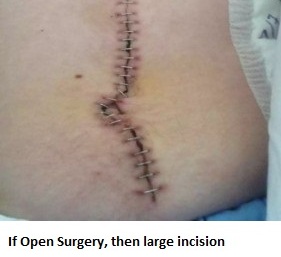Three years ago, when 60 year old Sushama Devi was diagnosed with rectal cancer, she thought that was the end of life as she knew it. But, Keyhole (laparoscopic) rectal cancer surgery came to her rescue and saved her from the disease as well as the lifelong suffering of permanent colostomy. Today, with her cancer cured, and no compromise in her lifestyle she looks forward to a long and healthy life. Please read on…

A nursing assistant by profession, 60 year old Sushama Devi was living a peaceful life in Kerala with two of her three children in the nursing profession abroad and one daughter working in a local society. Besides the occasional flu or common cold, Sushama Devi had not faced any serious medical issues in her life.
Over time she developed constipation, and bowel movement became irregular and difficult. And then one day after relieving herself, she noticed traces of blood in her stools and realized that it was not from any superficial wounds.
 Alarmed, she consulted her local physician. After examination, he broke the news to her – she had cancer in her rectum, at an advanced stage.
Alarmed, she consulted her local physician. After examination, he broke the news to her – she had cancer in her rectum, at an advanced stage.
Sushama’s words choke up in her throat when she recalls the trauma she went through as she came to terms with what her physician had told her.
The rectum is amongst the last digestive organs in our gastrointestinal tract. It stores digested food as stools, which are evacuated from our bodies every morning in the toilet. Anal sphincters in our anal canal act as valves which open only when we sit on a commode and decide to defecate.
The human rectum is about 12 cm long. Its upper end connects to our large intestine and the lower end connects to the anal canal. Our body structure is such that the rectum is protectively housed in a small space within our pelvis, and is surrounded by pelvic bones from all sides.
 The growth of a cancerous tumour in the rectum is called rectal cancer. Rectal cancer is one of the more common types of digestive organ cancers in South India.
The growth of a cancerous tumour in the rectum is called rectal cancer. Rectal cancer is one of the more common types of digestive organ cancers in South India.
Hailing from a medical background, Sushama was aware of the implications of her condition. She steeled herself to face the reality of her situation and was further boosted by the support of her family.
The first step was to source the right treatment. Most surgeons they met were adept in open cancer surgery. One of the biggest limitations of open surgery is that surgeons are restricted to operate only in those areas which can be accessed by their hands. A small pelvis stuffed with rectum is difficult for open cancer surgeons to access.
To add to the complication, Sushama’s tumour was very low in the rectum, close to the anus, making it almost impossible for an open surgeon to reach there to suture back the healthy colon to the anus after removing the tumor.
 In order to complete the open surgery, they would be forced to permanently close the anus and make a new opening on the lower abdomen near the belly button that would permanently serve as a new anus for discharging the stools. This kind of an opening is called a permanent colostomy and the surgery is called APR or Abdomino Perineal Resection.
In order to complete the open surgery, they would be forced to permanently close the anus and make a new opening on the lower abdomen near the belly button that would permanently serve as a new anus for discharging the stools. This kind of an opening is called a permanent colostomy and the surgery is called APR or Abdomino Perineal Resection.
Patients undergoing APR may survive cancer but their life style is severely compromised. For the rest of their lives, they are required to wear a plastic bag wrapped around their new anus (i.e the colostomy opening in the lower abdomen). Stools formed after digestion fall into the bag as if it were a commode. Patients have no control over defecation because the sphincters which act as a lock at the anus, cannot be transferred or constructed at the colostomy opening.
 Hence, such patients have to wait for the bag to fill with faeces, then untie the bag, empty it in a toilet commode, wash the bag or replace it with a new one, and wear it again.
Hence, such patients have to wait for the bag to fill with faeces, then untie the bag, empty it in a toilet commode, wash the bag or replace it with a new one, and wear it again.
Not a pleasant daily routine. Is it?
The other option was a Keyhole (laparoscopic) cancer surgery and luckily for Sushama, her physician referred her to Dr. Senadhipan.
Sushama’s son researched through the internet and was convinced by Dr. Senadhipan’s profile and the family wasted no time in connecting with him.
Sushama recalls her first meeting with the Doctor, “As soon as the conversation started, I knew that I was in good hands. He understood my condition immediately. That in itself was a big relief. She continues, “Throughout our consultation, I felt a very positive vibe. He was precise in his explanation of the procedure and advised that a surgery was necessary. But, he recommended that I undergo 25 sessions of radiation, prior to the surgery.”
 Once the Radiation helped shrink the tumour considerably, Dr Senadhipan operated on her with Keyhole surgery through minute incisions of 5-12mm (equivalent to the size of one to three rice grains). Due to the small size of the incisions the patient feels almost no pain after surgery, recovers much quicker and is less susceptible to infections caused by incision wounds.
Once the Radiation helped shrink the tumour considerably, Dr Senadhipan operated on her with Keyhole surgery through minute incisions of 5-12mm (equivalent to the size of one to three rice grains). Due to the small size of the incisions the patient feels almost no pain after surgery, recovers much quicker and is less susceptible to infections caused by incision wounds.
 On the other hand, in open surgery incisions are very large, about 6-9 inches long (i.e the size of a fully stretched adult palm). This results in a painful and long recovery period after surgery. Chances of infections too, are high.
On the other hand, in open surgery incisions are very large, about 6-9 inches long (i.e the size of a fully stretched adult palm). This results in a painful and long recovery period after surgery. Chances of infections too, are high.
Another huge benefit of laparoscopic surgery is that remote parts of the body such as low end of rectum can be reached with long and slender instruments. This makes it for the entire tumour to be removed and also the quality of the patient’s life, after the surgery, does not suffer.
In spite of obvious benefits of Keyhole Surgery and its proven efficacy in cancer patients as published in many reputed scientific journals, most surgeons still continue to perform these surgeries by Open method, thus severely restricting the choices available to patients.
In Sushama Devi’s case, Dr Senadhipan was able to resect the tumour completely as well as join the colon to the anus laparoscopically. Sushama’s tumour wasn’t small; it weighed 2.5 kg.
 As a result of Keyhole Surgery, Sushama Devi is not only free of cancer today but is also able to lead a normal life. She doesn’t have to live with a colostomy bag tied around her waist and suffer everyday trauma of defecating in the most unnatural and unpleasant way.
As a result of Keyhole Surgery, Sushama Devi is not only free of cancer today but is also able to lead a normal life. She doesn’t have to live with a colostomy bag tied around her waist and suffer everyday trauma of defecating in the most unnatural and unpleasant way.
There is a smile on Sushama’s face as she talks about the time immediately after her surgery, “When I came around after the operation, I felt no pain at all. I asked those nearby whether my surgery was over and was pleasantly surprised when they told me it was all done.I know how traumatic the recovery is after an open surgery. Thanks to Dr Senadhipan who performed the keyhole surgery due to which my recovery time was very quick too.”
 Sushama Devi is back to the routines of healthy life, with only scheduled visits to the doctor for regular check-ups as a preventive measure to detect any unlikely recurrence.
Sushama Devi is back to the routines of healthy life, with only scheduled visits to the doctor for regular check-ups as a preventive measure to detect any unlikely recurrence.
She has a simple message for those suffering a similar fate as hers, “Keep fears aside, they will only make the condition worse. Find the right doctor. I highly recommend Dr. Senadhipan, he is the best doctor, at least in India, for keyhole cancer surgeries of digestive organs”.
“Initially, when my colleagues and relatives visited, the only advice they could give me was to have faith and pray to God, as they felt it would bring me peace at a time when there was no hope for me., But, I fully recovered. The credit goes entirely to my Doctor and the God who played his part by leading me to him.”
 “He is professional in his approach but at the same time he is personally invested in his patients. The expenses incurred were also reasonable. God forbid, if any of my friends, family members or acquaintances suffer from a similar condition, I would without a doubt recommend them to Dr Senadhipan”.
“He is professional in his approach but at the same time he is personally invested in his patients. The expenses incurred were also reasonable. God forbid, if any of my friends, family members or acquaintances suffer from a similar condition, I would without a doubt recommend them to Dr Senadhipan”.
“I wish Dr. Senadhipan great life ahead and pray that God showers him with blessings so that he can continue to play the role of saviour for several others like me,” Sushama signs off with a big smile.